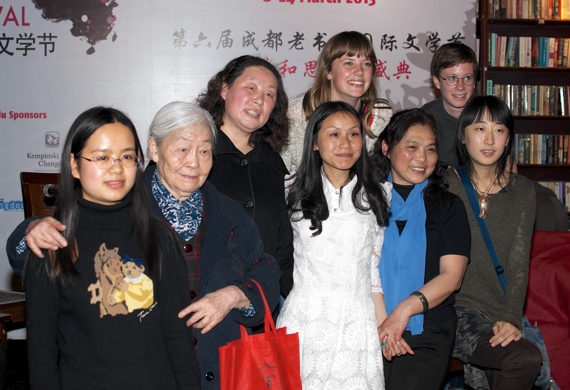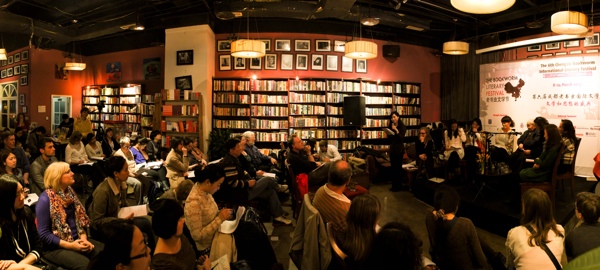Check out Notes on Women Writers Across the Generations, Opening Event of the 2013 Chengdu Bookworm International Literary Festival:
When Catherine Platt, program designer for the 2013 Chengdu Bookworm Literary Festival, asked me for recommendations of local women writers, I was happy to suggest my classmate at Sichuan University, Liu Guoxin, who was active in southwest China’s poetry scene. The young poet was eager to introduce more local women writers who were open to sharing their work with a Western audience. While Platt had requested one woman writer from each of three generations; post-40’s, 60’s and 80’s; she got much more than she bargained for.
Chengdu as Place in Poetry
There they were, seated in a semi-circle upon a small stage, glasses of water or tea arranged about a floral bouquet on a small table before them. Platt sat on the corner of the stage, mediating between poets, their Mandarin/Sichuanese to English interpreter and a standing room only audience. Liu Guoxin had provided the festival with not just three women, as Platt had asked for, but no less than seven writers, a few poems by each of whom were collated, translated and distributed in packets to audience members for reference during the panel discussion.
An anchor of inestimable gravitas, 87 year old Wang Erbei, sat at the apex of the poetess-parabola. Stoic in expression, Wang was heavily clothed, neat as a pin with her hands crossed at the center of her lap.
Zhou Yuxia, a post-60’s writer who works arduously as an advocate of minority nationality literature, proffered an answer to an audience member’s question as to the importance of place, specifically Chengdu as place, in her poetry. She answered that the city of Chengdu is just a stepping off stone for her, a place to depart from en route to the plateau or mountains west north and south of us. With great feeling in her voice she spoke of giving herself to nature when she arrived in its midst, and sighed with infinite resignation when she spoke of taking that self back upon return to the city.
Tao Jiagui, a late addition to the women’s entourage, thus not included in the packet of translations, also had much to say on the subject of place. Also post-60’s, she was a third generation Chengdu resident. She spoke as a psycho-geographer, in brilliant local Sichuan dialect, of the loss of physical culture in Chengdu. Tao lamented the loss of landmarks in the city, physical icons which marked not only physical space, but occupied a place in local residents’ psyches, hearts, and souls, which populated their dreams and thoughts of the city as a whole. She said that what the city that had once been has now slipped through her fingers, that there was nothing left to touch her heart. At last, Tao concluded her passionate monologue by saying that place was a constraint on her as a writer, but that she didn’t have enough ambition to leave.
Yan Ge, the youngest success story of the group, only 29 years old with ten novels published, including the critically acclaimed May Queen (2008), answered a question concerning current events in southwest China. Her answer was interesting, indicating that she maintained a dissociative distance not only from place in her writing, but also a distance from the present time. She could not write in response to current events, she said, but believed it necessary to let things pass away, to die, to ferment and to become nutrient for the soil and new growth of her writing.
The Roles of Women and Money

Liu Guoxin, even younger than Yan Ge, and an up and coming star on the Chinese poetry circuit, answered an audience question concerning the plight of women in China today. She intimated that it is a vicious environment. She conceded that women today at least have a voice, albeit weak. She explained that women who do not capitulate to social norms are still ostracized in Chinese society today, and that there is no support system, education or rights for the marginalized. She stressed that if we really want to understand women’s situation in China today, we should study rural women’s lives.
In answer to a query concerning the earning power of poetry today, Zhu Wangying, post 70’s Chengdu poet, dressed in coy lace and humble in demeanor, answered that the average poem earned her 50 yuan (roughly equivalent to $8 US). The audience tittered and the women on stage were visibly animated in face and posture as she explained why she continued to write given little chance to earn a living with it. She explained that she had never thought of poetry as a money game, that she had always understood she would have to find other work to support her poetry habit. She concluded with an anecdote a-la-Master Zhuang by saying that she often wondered if she was a writer working as a banker or a bank worker thinking she was a writer.
Poetry is the History of the Soul

As a student of classical studies, I asked the panel whether their approach to the notion of ‘soul’ was from a Buddhist, Taoist, Confucian or Marxist canon. It was kind of a doozy, but I figured I’d never have a chance like this again, so I asked. The answers two of the women gave blew us away. Wang Erbei, the oldest of the group answered by quoting Taiwanese writer, poet, educator and critic Yu Guanzhong’s statement that “Poetry is the History of the Soul.”
She ended her soliloquy by saying that, “Poems are the souls of people.” While Wang’s answer had treated the question more directly than she had answered most questions, Tao Jiagui’s answer to the same question was less fathomable. She said that while Taoism is a movement of self from inside towards the outside of the world, Confucian teachings bring one from outside back into the world. She elliptically suggested that the ratio, or combination of both these movements is very good for poetry. Then she baffled everyone with the ko-an:
“And if this is so, then Marxism is a poem in itself.”
Which is when the panel discussion drew to a close, and jazz started up in the adjoining room of the Bookworm cafe. With such a conundrum drumming in my ears and rattling in my heart, I had the distinct impression that the next two and half weeks of the Bookworm Literary Festival were going to be, well, provocative.
Can you post some examples or good lines of their poetry? While their perspective is interesting, I’d like to see how they present that in their poetry.
Yeah I would like to read some examples as well 🙂 Good story!
Here are a couple of examples of poems by the participants.
Hollow Bamboo by Wang Xiaoge
The wheel of fate
is turned by other hands.
So far it’s beyond me to stand
fearless on such a tightrope,
like finding oneself on a city ring road
where the scenery is removed, revolved, hauled away,
by the opening and closing lines of fate,
while the old folks on the verge
wear expressions of concentration.
This kind of reading means first turning a fallen leaf of the scholartree
and then restoring a falling bamboo,
whereupon my hollow mind
will overflow with the pent-up sound of two thousand years of tearing silk.
The Thinking Arhat by Wang Erbei
Temple chimes resound with childhood music
As drowsy gods head home at dusk
You, seated on the ship of Marco Polo
Pass serried mist-filled gorges, troubled waters
The tides give rolling voice to a voiceless prayer.
Translations by Catherine Platt
is it possible to include their names in chinese characters? thanks
great article
Would you plz recommend some reading stuff by wommen writers of Chengdu? Thanks!